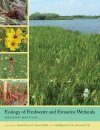Textbook
By: Darold P Batzer(Editor), Rebecca R Sharitz(Editor)
361 pages, colour & b/w photos, b/w illustrations, tables
![Ecology of Freshwater and Estuarine Wetlands Ecology of Freshwater and Estuarine Wetlands]()
Click to have a closer look
About this book
Contents
Customer reviews
Biography
Related titles
About this book
This second edition of this important and authoritative survey provides students and researchers with up-to-date and accessible information about the ecology of freshwater and estuarine wetlands. Prominent scholars help students understand both general concepts of different wetland types as well as complex topics related to these dynamic physical environments. Careful syntheses review wetland soils, hydrology, and geomorphology; abiotic constraints for wetland plants and animals; microbial ecology and biogeochemistry; development of wetland plant communities; wetland animal ecology; and carbon dynamics and ecosystem processes. In addition, contributors document wetland regulation, policy, and assessment in the US and provide a clear roadmap for adaptive management and restoration of wetlands.
New material also includes an expanded review of the consequences for wetlands in a changing global environment. Ideally suited for wetlands ecology courses, Ecology of Freshwater and Estuarine Wetlands, Second Edition, includes updated content, enhanced images (many in color), and innovative pedagogical elements that guide students and interested readers through the current state of our wetlands.
Contents
Contributors
Preface
1. Ecology of freshwater and estuarine wetlands: an introduction
2. Wetland soils, hydrology, and geomorphology
3. Abiotic constraints for wetland plants and animals
4. Wetland microbial ecology and biogeochemistry
5. Development of wetland plant communities
6. Wetland animal ecology
7. Carbon dynamics and ecosystem processes
8. United States wetland regulation, policy, and assessment
9. Wetland restoration
10. Consequences for wetlands of a changing global environment
Literature cited
Index
Customer Reviews
Biography
Darold P. Batzer is Professor of Entomology at the University of Georgia. He is the coeditor of several volumes, including Wetland Habitats of North America (UC Press), Ecology of Freshwater and Estuarine Wetlands (UC Press), Invertebrates in Freshwater Wetlands of North America and Biomonitoring and Management of North American Freshwater Wetlands. He served as Editor-in-Chief of Wetlands, the scholarly journal of the Society of Wetland Scientists, and has taught courses in Wetland Ecology and Aquatic Ecology.
Rebecca Sharitz is Professor of Plant Biology at the University of Georgia and coeditor of two books for the U.S. Atomic Energy Commission and has taught courses in Wetlands Ecology.
Textbook
By: Darold P Batzer(Editor), Rebecca R Sharitz(Editor)
361 pages, colour & b/w photos, b/w illustrations, tables
Reviews of the first edition:
"The editors are to be highly commended for [...] the straightforward and honest writing style that continually weaves its way throughout this text."
– Mark W. Hester, Ecology
"Provides a comprehensive introduction to the great ecological breadth and complexity that wetlands exhibit, ranging from microbial process to biogeography and global climate."
– Wetlands
"A comprehensive and timely introduction to wetlands ecology [...] Would serve as an excellent textbook for classes focusing on wetlands, wetland ecology, and related classes where system ecology and function may be of interest."
– Journal of the Botanical Research Institute of Texas


































